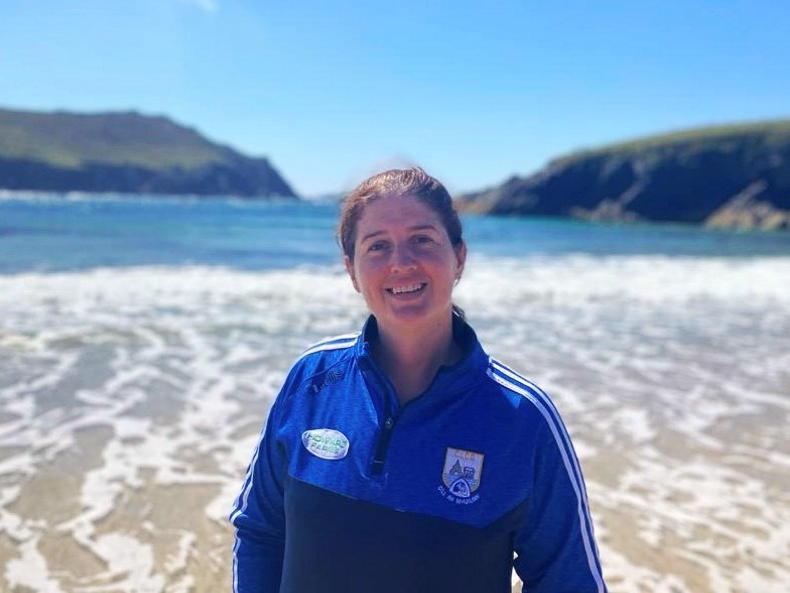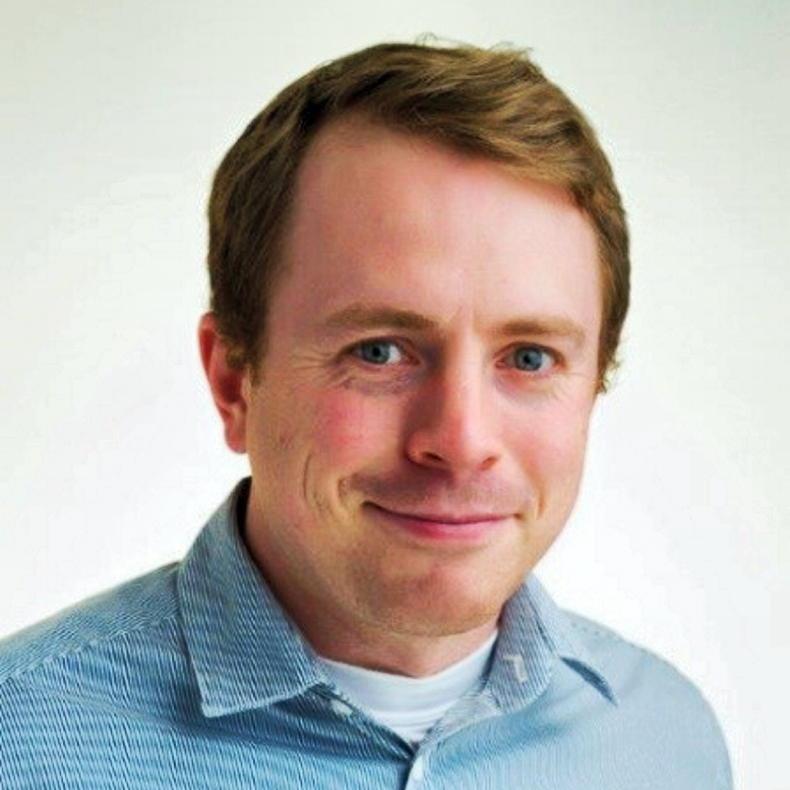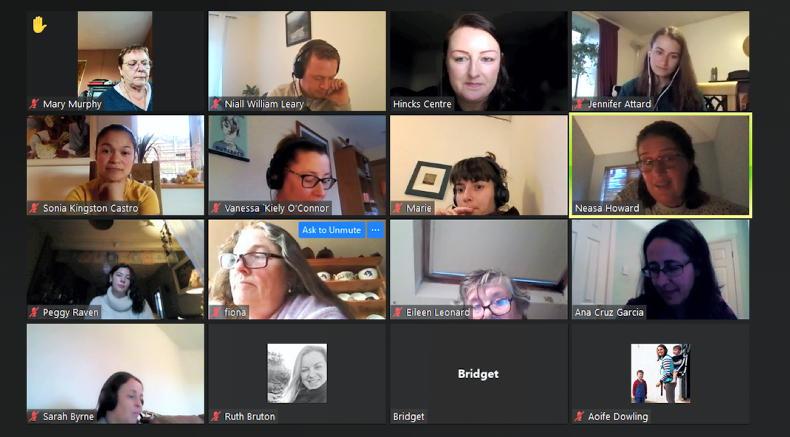I love living in rural Ireland, but at times it can feel lonely – especially if you’re a new mother or are new to the area. I remember having three small kids and no “real” job. I felt unskilled and under-experienced in many ways, but I also felt that I had so much to offer the right profession and my community too – I just needed support and the right opportunity to come along. Having spoken with many rural women through the years writing for ICL, I know I’m not alone in having felt this way.
A recent programme at the Hincks Centre for Entrepreneurship Excellence in Munster Technological University (MTU) sought to address these feelings. The name of the programme, Rural Femmes, gives a hint to its roots.
As an Erasmus+KA2-funded programme, it was developed by the Chambre Départemental d’Agriculture de Dordogne from Perigueux, France, and includes partnerships in Spain and Germany as well as here in Ireland. In October 2021, it launched its first Irish pilot programme through the Hincks Centre at MTU.
Developing skills and confidence
Rural Femmes aims to support rural women in two ways: to help develop their digital, entrepreneurial and interpersonal skills and to address each participant’s specific technical need (or to address and help achieve a personal or professional goal).
The programme ran from October to December 2021 and was conducted virtually, with three online sessions taking place each week.
MTU is now seeking to run the programme again, thanks to its initial success. Sessions covered the topics of tourism, rural policy and marketing, among others. Many of the participants were connected in some way to agriculture, so there was a focus on sustainable farm diversification.
One participant, Neasa O’Shea (who lives in Co Cork, on her family’s tillage farm), didn’t enter the programme with a specific business idea, but she wanted to see how she could benefit her local community and get more involved in its development.

Neasa O'Shea is a primary school teacher who lives on her family farm in north Co Cork. She participated in the programme while taking a career break.
Career break
“I live just outside Killavullen village, which is 10 minutes outside Mallow heading towards Fermoy. I am actually a Kerry woman and fiercely proud of that,” she laughs. “I’m also a primary school teacher and I’ve taken a career break; I’m on a year out. My husband actually spotted the ad for Rural Femmes in the Farmers Journal and it was just something that piqued my interest. I signed up online - having no expectations - and I just went for it.”
There is no specific degree or certification provided upon completing this programme, which is free of charge, but Neasa says the relationships developed, stimulating conversations and learning modules gave her the confidence and skills to develop her community development goals.
“Lessons took place Sunday, Monday and Tuesday evenings for an hour and it was all online,” she explains. “At the start, I didn’t know what to expect, but it was actually lovely. It was the time of year when it was cold and dark outside, I didn’t have to arrange childcare if my husband was working late, I could just be in the other room on Zoom.”
Making connections
Dr Niall O’Leary (pictured) is research fellow at the Hincks Centre. He was one of three lecturers on the programme and says the participants were enthusiastic and keen to learn, share and make connections.

“Often when people have entrepreneurial ideas and share them with their family and friends, the family and friends will listen, but they are not in the same headspace and so often don’t engage deeply,” he explains.
“Sharing ideas with like-minded women in similar circumstances led to deeper consideration and faster progress. For me, their ideas were both interesting and inspiring, and facilitating their progress while they increasingly helped each other was very rewarding. It proved to me there is a lot of potential to be unlocked.”
Neasa says most participants came into the programme with a business idea in mind, but some, like herself, came to help develop an idea or a goal.
“The whole thing was, if you had a business idea there was lots of advice available on how to progress, but even if you didn’t – and I didn’t – the course was clear in breaking down what you’d need to do to get ideas and focusing in on one,” she says. “There was no real pressure, but there was a blank document with clear targets outlining what you hoped to achieve and what your costs would be. Niall did a lot of logistics - trying to work out if we had a viable project, and then Ana [Dr Ana Cruz Garcia] would go through sustainable rural tourism with us - which was really interesting.”
Development opportunities
Ana is a lecturer at MTU and specialises in marketing – she is passionate about rural tourism and focused her Rural Femmes lectures in this area.
“I really enjoyed showing these women the wide variety of possibilities there is in rural tourism for farm diversification,” she says. “I also learned from their own current and potential ideas; all innovative, creative and sustainable. While sustainability is a topical area in business today, what I noticed in the case studies discussions was a genuine interest in creating businesses that are economically successful but also in support of their rural communities and the natural heritage around them.”
Neasa concurs.
“For me, I look at the community I’m living in - and that’s really important to me: to see the opportunities in the community. For tourism, in particular, but in a sustainable and a natural way,” she says. “I look at my kids and think - if they don’t go farming, what are their options? It’s about developing what’s here. So my idea was to develop some guided walks [around the community]. Not for profit, but to bring tourists to the area.”
More than support
Rebecca Robinson was the third lecturer on the programme and is a researcher at the Hincks Centre. She focused on digital presence in business (like making use of social media streams) and says connecting with enterprising and like-minded women each week provided so much more than the support and training the programme provided.

The Rural Femmes programme took place entirely online, which was helpful for participants who live in different regions and have busy schedules.
“It also created a ‘buzz’ and gave them a ‘boost’ in times of increased isolation,” she explains. “I also enjoyed this lovely online community that we all built over the few weeks of training. Albeit online, their energy and enthusiasm came through strongly. As a trainer, I also learned a huge deal from the women and continue to be inspired by their drive and attitudes.” CL
On 31 March, there was an online Rural Femmes Project Multiplier Event, where the lecturers from the programme presented on their approach and the result of the pilot programme in Ireland.
At the event, it was noted that keeping the programme entirely online helped lead to its success, since access and childcare is an issue for rural women when it comes to furthering education or upskilling.
While sharing the results of their post-programme participants’ survey, one comment noted: “Having completed this course, while I may not know exactly how to develop a rural tourism idea, I know for certain that there is a wealth of information and support available if you just seek it.”
If you are interested in learning more about the Rural Femmes programme, you can fill out an expression of interest form on their website.
Rebecca says more information will be available shortly and registered individuals will be contacted with the upcoming programme details.
Read more
A big Wexford win for Certified Irish Angus
More women need to be encouraged to become engineers
I love living in rural Ireland, but at times it can feel lonely – especially if you’re a new mother or are new to the area. I remember having three small kids and no “real” job. I felt unskilled and under-experienced in many ways, but I also felt that I had so much to offer the right profession and my community too – I just needed support and the right opportunity to come along. Having spoken with many rural women through the years writing for ICL, I know I’m not alone in having felt this way.
A recent programme at the Hincks Centre for Entrepreneurship Excellence in Munster Technological University (MTU) sought to address these feelings. The name of the programme, Rural Femmes, gives a hint to its roots.
As an Erasmus+KA2-funded programme, it was developed by the Chambre Départemental d’Agriculture de Dordogne from Perigueux, France, and includes partnerships in Spain and Germany as well as here in Ireland. In October 2021, it launched its first Irish pilot programme through the Hincks Centre at MTU.
Developing skills and confidence
Rural Femmes aims to support rural women in two ways: to help develop their digital, entrepreneurial and interpersonal skills and to address each participant’s specific technical need (or to address and help achieve a personal or professional goal).
The programme ran from October to December 2021 and was conducted virtually, with three online sessions taking place each week.
MTU is now seeking to run the programme again, thanks to its initial success. Sessions covered the topics of tourism, rural policy and marketing, among others. Many of the participants were connected in some way to agriculture, so there was a focus on sustainable farm diversification.
One participant, Neasa O’Shea (who lives in Co Cork, on her family’s tillage farm), didn’t enter the programme with a specific business idea, but she wanted to see how she could benefit her local community and get more involved in its development.

Neasa O'Shea is a primary school teacher who lives on her family farm in north Co Cork. She participated in the programme while taking a career break.
Career break
“I live just outside Killavullen village, which is 10 minutes outside Mallow heading towards Fermoy. I am actually a Kerry woman and fiercely proud of that,” she laughs. “I’m also a primary school teacher and I’ve taken a career break; I’m on a year out. My husband actually spotted the ad for Rural Femmes in the Farmers Journal and it was just something that piqued my interest. I signed up online - having no expectations - and I just went for it.”
There is no specific degree or certification provided upon completing this programme, which is free of charge, but Neasa says the relationships developed, stimulating conversations and learning modules gave her the confidence and skills to develop her community development goals.
“Lessons took place Sunday, Monday and Tuesday evenings for an hour and it was all online,” she explains. “At the start, I didn’t know what to expect, but it was actually lovely. It was the time of year when it was cold and dark outside, I didn’t have to arrange childcare if my husband was working late, I could just be in the other room on Zoom.”
Making connections
Dr Niall O’Leary (pictured) is research fellow at the Hincks Centre. He was one of three lecturers on the programme and says the participants were enthusiastic and keen to learn, share and make connections.

“Often when people have entrepreneurial ideas and share them with their family and friends, the family and friends will listen, but they are not in the same headspace and so often don’t engage deeply,” he explains.
“Sharing ideas with like-minded women in similar circumstances led to deeper consideration and faster progress. For me, their ideas were both interesting and inspiring, and facilitating their progress while they increasingly helped each other was very rewarding. It proved to me there is a lot of potential to be unlocked.”
Neasa says most participants came into the programme with a business idea in mind, but some, like herself, came to help develop an idea or a goal.
“The whole thing was, if you had a business idea there was lots of advice available on how to progress, but even if you didn’t – and I didn’t – the course was clear in breaking down what you’d need to do to get ideas and focusing in on one,” she says. “There was no real pressure, but there was a blank document with clear targets outlining what you hoped to achieve and what your costs would be. Niall did a lot of logistics - trying to work out if we had a viable project, and then Ana [Dr Ana Cruz Garcia] would go through sustainable rural tourism with us - which was really interesting.”
Development opportunities
Ana is a lecturer at MTU and specialises in marketing – she is passionate about rural tourism and focused her Rural Femmes lectures in this area.
“I really enjoyed showing these women the wide variety of possibilities there is in rural tourism for farm diversification,” she says. “I also learned from their own current and potential ideas; all innovative, creative and sustainable. While sustainability is a topical area in business today, what I noticed in the case studies discussions was a genuine interest in creating businesses that are economically successful but also in support of their rural communities and the natural heritage around them.”
Neasa concurs.
“For me, I look at the community I’m living in - and that’s really important to me: to see the opportunities in the community. For tourism, in particular, but in a sustainable and a natural way,” she says. “I look at my kids and think - if they don’t go farming, what are their options? It’s about developing what’s here. So my idea was to develop some guided walks [around the community]. Not for profit, but to bring tourists to the area.”
More than support
Rebecca Robinson was the third lecturer on the programme and is a researcher at the Hincks Centre. She focused on digital presence in business (like making use of social media streams) and says connecting with enterprising and like-minded women each week provided so much more than the support and training the programme provided.

The Rural Femmes programme took place entirely online, which was helpful for participants who live in different regions and have busy schedules.
“It also created a ‘buzz’ and gave them a ‘boost’ in times of increased isolation,” she explains. “I also enjoyed this lovely online community that we all built over the few weeks of training. Albeit online, their energy and enthusiasm came through strongly. As a trainer, I also learned a huge deal from the women and continue to be inspired by their drive and attitudes.” CL
On 31 March, there was an online Rural Femmes Project Multiplier Event, where the lecturers from the programme presented on their approach and the result of the pilot programme in Ireland.
At the event, it was noted that keeping the programme entirely online helped lead to its success, since access and childcare is an issue for rural women when it comes to furthering education or upskilling.
While sharing the results of their post-programme participants’ survey, one comment noted: “Having completed this course, while I may not know exactly how to develop a rural tourism idea, I know for certain that there is a wealth of information and support available if you just seek it.”
If you are interested in learning more about the Rural Femmes programme, you can fill out an expression of interest form on their website.
Rebecca says more information will be available shortly and registered individuals will be contacted with the upcoming programme details.
Read more
A big Wexford win for Certified Irish Angus
More women need to be encouraged to become engineers










 This is a subscriber-only article
This is a subscriber-only article










SHARING OPTIONS: